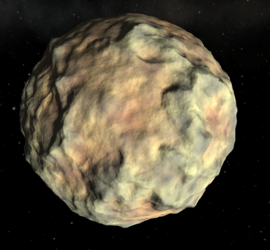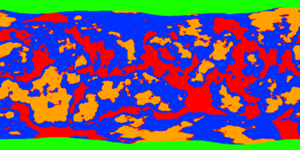Pol
| Pol | ||
| Pol as seen from orbit. | ||
| Moon of Jool | ||
| Orbital Characteristics | ||
| Semi-major axis | 179 890 000 m [Note 1] | |
| Apoapsis | 210 624 207 m [Note 1] | |
| Periapsis | 149 155 794 m [Note 1] | |
| Orbital eccentricity | 0.171 | |
| Orbital inclination | 4.25 ° | |
| Argument of periapsis | 15 ° | |
| Longitude of the ascending node | 2 ° | |
| Mean anomaly | 0.9 rad (at 0s UT) | |
| Sidereal orbital period | 901 903 s | |
| 41 d 4 h 31 m 42.6 s | ||
| Synodic orbital period | 909 742.2 s | |
| Orbital velocity | 1 055 - 1 489 m/s | |
| Longest time eclipsed | 11 381 s | |
| Physical Characteristics | ||
| Equatorial radius | 44 000 m | |
| Equatorial circumference | 276 460 m | |
| Surface area | 2.4328494×1010 m2 | |
| Mass | 1.0813507×1019 kg | |
| Standard gravitational parameter | 7.2170208×108 m3/s2 | |
| Density | 30 305.392 kg/m3 | |
| Surface gravity | 0.373 m/s2 (0.038 g) | |
| Escape velocity | 181.12 m/s | |
| Sidereal rotation period | 901 902.62 s | |
| 41 d 4 h 31 m 42.6 s | ||
| Sidereal rotational velocity | 0.30653 m/s | |
| Synchronous orbit | Outside sphere of influence | |
| Sphere of influence | 1 042 138.9 m [Note 1] | |
| Atmospheric Characteristics | ||
| Atmosphere present | No | |
| Scientific multiplier | ||
| Surface | 12 | |
| Splashed | N/A | |
| Near space | 9 | |
| Outer space | 8 | |
| Recovery | 8 | |
|
| ||
Pol is the smallest of the five natural satellites of Jool. The terrain is proportionally quite rough, with large ridges that make it resemble a pollen grain.
Pol has the second-lowest surface gravity in the Kerbol system: only Eve's moon Gilly is less massive. This makes bipropellant engines on a lander somewhat unnecessary, as landing can be completed with RCS thrusters only. Landing on Pol may still be difficult to inexperienced pilots due to the hazardous terrain with mountains, canyons, 45° slopes and jagged rocks, as well as its tiny sphere of influence.
Contents
In-game Description
| “ | This moon was especially hard to spot, as it looks just like a pollen grain, particularly when observed through telescopes based near dusty fields. Pol was finally discovered when someone decided to write down the location of the pollen, after given up on yet another failed attempt to be rid of the smudge. |
” |
Orbit
Pol is in a large orbit around Jool with moderate eccentricity and inclination, which indicates it may be a captured asteroid like Gilly and Bop. Pol is tidally locked to Jool.
Topography
Pol has many unique characteristics. The surface is wrinkled and uneven. It has many spiked mountains and very large cliffs that can reach up to 4 km high, and many kilometers wide. Many mountain ranges are circular and form bowl-shaped valleys. Its surface color ranges from brown over pale yellow to pale green. It appears to be composed of various phosphoric or sulfuric compounds and is covered in peculiar spire-shaped rocks.
Although very uneven, the surface of Pol is still not as irregular as that of Bop, despite its lower gravity. This suggests volcanic activity that re-paved the surface, or that Pol was formed via low-velocity accretion at relatively low temperatures.
A rover is difficult to drive on the surface of Pol because of the uneven terrain and low gravity.
The terrain scatter on Pol looks a bit like spiky, twisted rocks.
Biomes
Pol has 4 biomes.
Biome list
|
Reference Frames
| Time warp | Minimum Altitude |
|---|---|
| 1× | Any |
| 5× | 5 000 m |
| 10× | 5 000 m |
| 50× | 5 000 m |
| 100× | 8 000 m |
| 1 000× | 12 000 m |
| 10 000× | 30 000 m |
| 100 000× | 90 000 m |
An orbit under 3000 meters is unwise, as it will almost always result in colliding with a mountain, spire, or plateau.
Trivia
- According to its ingame description it was a long time before Pol was officially discovered, as astronomers kept trying to wipe it off their telescopes, thinking it a grain of pollen. Pol's name may refer to this uncanny resemblance, even though the kerbal word for pollen would actually be "Nelop".
- Pol's name may or may not have anything to do with the T.V. show The Incredible Dr. Pol on the National Geographic channel.
Gallery
Changes
- Added biomes
- Mass increased by ~3.16x, semi-major axis increased.
- Initial Release











